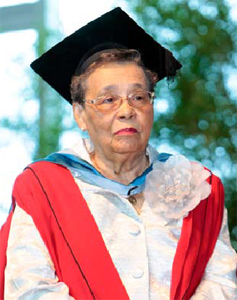|
November 2012

Issue Home >>
|

 Citation Citation
Chancellor, people have been reading newspapers for 400 years; for 300 of those years the papers have been written in the English language. Here in Trinidad and Tobago people have been reading newspapers for 95 years, and for the last 25 of those, the local newspapers have been edited by the indomitable Therese Mills.
Among those who practise the art of writing, we are told that journalists are the professionals who enjoy the most intimate relationship with society. Ms Mills’ relationship with our society spans 55 years. It has not always been a woman’s world. So imagine what it took for one born in the 1920s to rise to the top of her profession. One can guess that such a ground-breaking ascent would have required courage, commitment and perhaps even some small quantum of cunning! These personal and social virtues notwithstanding, pale in comparison to her prodigious use and natural gift for the pen. She has authored three books for young readers: “Great West Indians,” “Life of Norman Manley” and “The Canefield Fire.” Her prolific pen has also produced nine volumes for children. Two other publications were commissioned and published by the Ministry of Education for instruction in schools across the country: “Peggy in Santa Cruz” and “Ramesh of El Socorro.”
In 1989, Therese Mills assumed the mantle as Editor-in-Chief of the country’s long established daily newspaper, the Guardian, having worked her way up from feature writer, senior feature writer, news editor and Sunday edition editor. For the last two decades she has been at the helm of another leading daily, the Newsday, for which she has been founding Editor and director. The path she has carved out has paved the way for the current vibrant role and leadership that women now exert in the industry – in other words: a small step for Therese Mills has produced a giant leap for womankind.
Throughout her productive career, Mrs Mills has covered events ranging from the Commonwealth Heads of Government conferences, to US presidential elections, to Grenada’s political turmoil surrounding the upheaval of October 1983. Her work has been recognised by numerous awards including the Caribbean Publishing and Broadcasting Association’s Most Outstanding Award for Caribbean Journalists, which she had received for three successive years. In 1987, she was honoured by the Republic with the Humming Bird Medal for Service to journalism.
Chancellor, for her pioneering role in local and regional journalism, I now present Therese Mills and invite you, by the authority vested in you by the Council and Senate of The University of the West Indies, to confer upon her the degree of Doctor of Letters, honoris causa.
|





